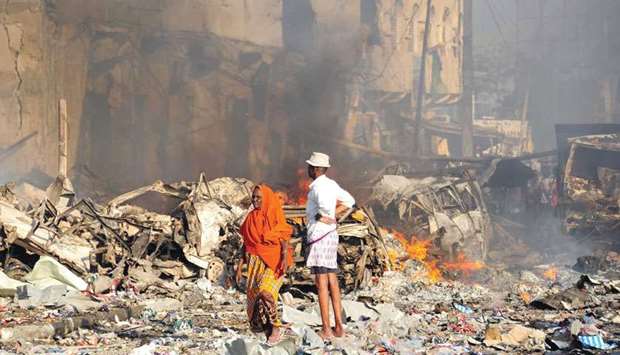The residents of Mogadishu were yesterday mourning the deadliest single attack in the history of Somalia after a suicide bomber killed at least 231 people when he detonated in a truck at a busy intersection in the Somali capital.
Senior police officer Ali Hassan Kulmiye confirmed the death toll from Saturday’s attack to DPA, with Madina Hospital director Mohamed Yusuf counting 221 people killed and officials at Erdegon Hospital counting another 10 victims from the blast.
The death toll jumped after dozens of bodies were recovered from the rubble and some of those wounded died of the injuries they sustained in the blast.
The number of dead is expected to rise as several other hospitals provide medical treatment for the bombing victims.
The explosion occurred at a major city intersection normally packed with cars, buses and taxis, where hotels, stores, restaurants and government buildings cater to locals.
The nearby Safari hotel is thought to have been a possible target in the attack for offering accommodation to Somalis returned from abroad, government workers and journalists.
Before detonating the truck he was driving, the suicide bomber had raced along a Mogadishu street at high speed, rolling over motorcycles and cars and shunting some vehicles stuck in traffic.
Security forces had opened fire on the truck but were unsuccessful in their attempt to shoot the driver.
Somali President Mohamed Abdullahi Mohamed called the attack a national tragedy.
In comments carried by state-run radio, the president called on the public to help the victims by giving blood and announced three days of mourning as thousands of people took to the city’s streets to visit local hospitals and look for their loved ones who were still missing.
No group has claimed responsibility for the attack, but Somali Information Minister Abdirahman Yarisow said the government believes it was carried out by Shebaab, a militant group affiliated with the Al Qaeda terrorist network.
“We are getting different numbers in terms of the casualty from the medical centres, but we have confirmed so far 137 (dead), most of them burned beyond recognition, police official Ibrahim Mohamed told AFP.
“The death toll could be higher because there are more than 300 wounded, some of them seriously,” he said, describing it as “the deadliest attack ever.”
Rescuers worked through the night to try to pull bodies from the rubble after the truck bomb exploded outside of the Safari Hotel on a busy road junction, levelling buildings and leaving many vehicles in flames.
In a posting on Facebook, the deputy speaker of the Somali Senate suggested there was evidence the toll could be well over 200.
“We visited Medina hospital where the director told us that 218 dead bodies were admitted the hospital since yesterday,” wrote Senator Abshir Ahmed, saying the hospital chief had told them 130 of the bodies had been “burned beyond recognition.”
“This is the most painful incident I can remember.”
Mogadishu’s mayor Tabid Abdi Mohamed also visited those wounded in the blast, saying he lacked words to describe what he had seen.
“What I have seen at the hospitals I have visited is unspeakable,” he said, calling on everyone to help in the rescue efforts.
“There is no tragedy worse than when someone comes to the dead body of their relative and cannot recognise them.”
Security officials said hundreds of people had been in the area at the time of the blast, with police saying it was difficult to get a precise number of victims because the bodies had been taken to different medical centres while others had been taken directly by their relatives for burial.
Security official Abdukadir Muktar earlier said hundreds of people had been either wounded or killed in the blast, saying that it went off at “a densely-populated intersection, so you can imagine the magnitude of casualties it could cause.”
“Today’s incident was a horrible attack carried out by Shebaab against innocent civilians that was not aimed at specific Somali government targets,” President Mohamed said.
“This shows how these violent elements are ruthlessly and indiscriminately targeting innocent people who were busy minding their own business.”
Although the Safari Hotel was popular, it was not one frequented by government officials — which have often been targeted by Shabaab militants.
In any case, the devastation caused was widespread.
Muhidin Ali, a Mogadishu resident who was close by at the time said it was, “the biggest blast I have ever witnessed, it destroyed the whole area.”
“We did not sleep last night and worked with rescue workers,” said Abdirisak Mohamed, one of the owners of a building that was destroyed, saying he believed there were still bodies under the rubble.
Meanwhile, the National Union of Somali Journalists said a freelance cameraman, Ali Nur Siyaad, had been killed and four other journalists wounded in the explosion.
The Shebaab was forced out of the capital six years ago by African Union and Somali troops, and subsequently lost control of major towns across southern Somalia.
However, the militants continue to control rural areas and launch attacks on military, government and civilian targets in Somalia, as well as terrorist raids in neighbouring Kenya.

A man and woman look at the damages on the site of the explosion of a truck bomb in the centre of Mogadishu late on Saturday.
